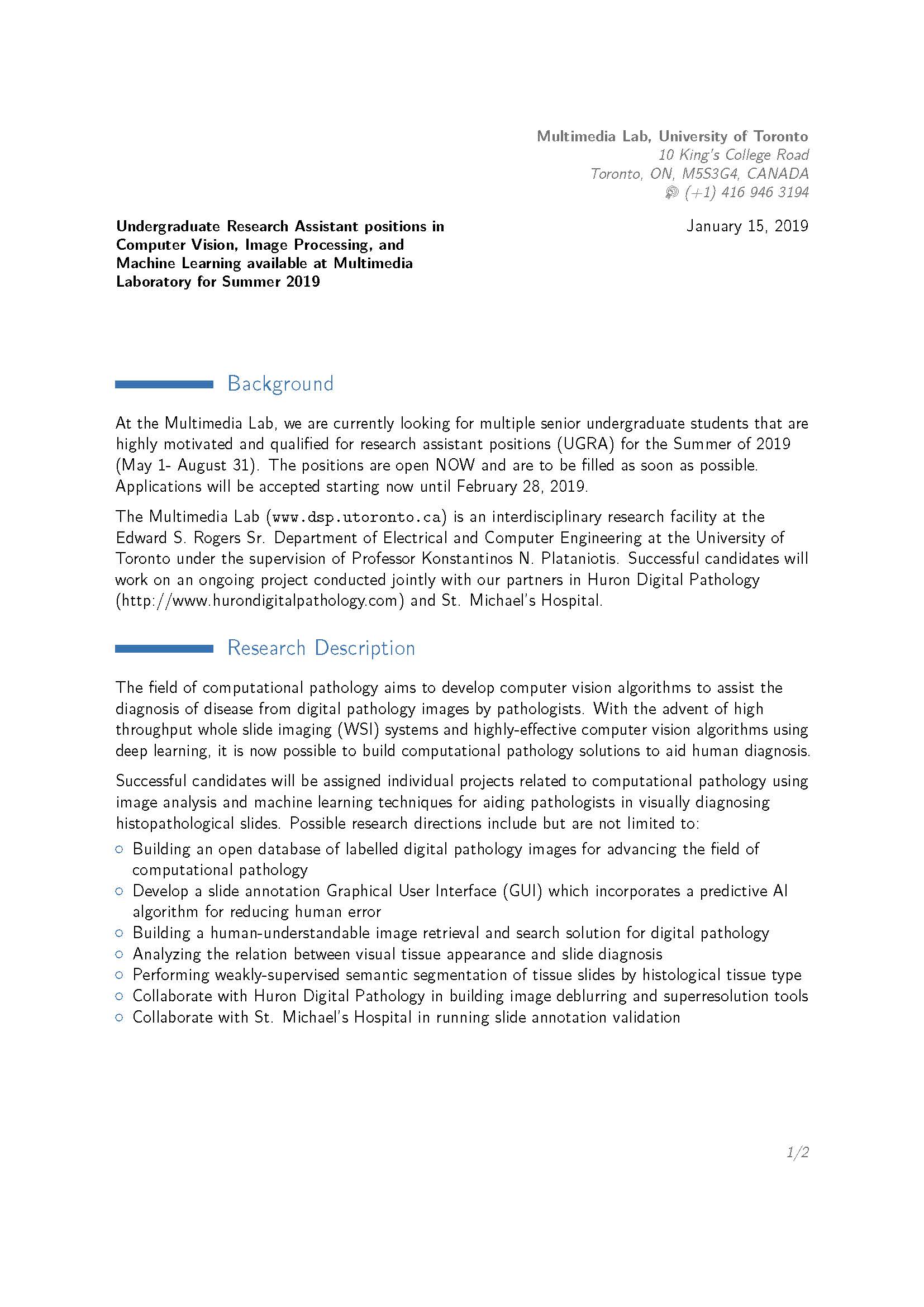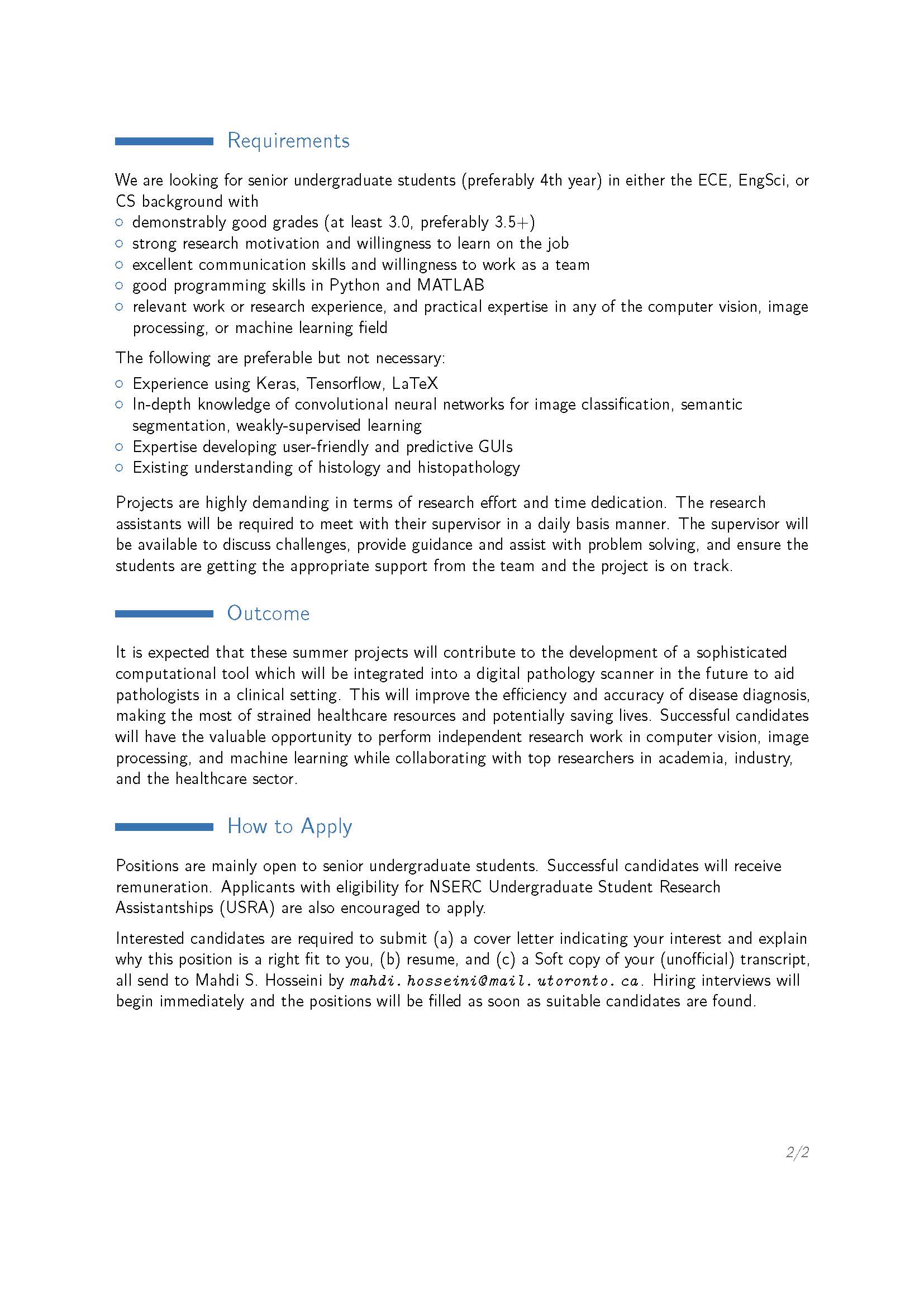Summer 2019
Undergraduate Research Assistant positions in Computer Vision, Image Processing, and Machine Learning available at Multimedia Laboratory
At the Multimedia Lab, we are currently looking for multiple senior undergraduate students that are highly motivated and qualified for research assistant positions (UGRA) for the Summer of 2019 (May 1- August 31). The positions are open NOW and are to be filled as soon as possible. Applications will be accepted starting now until February 28, 2019.
The Multimedia Lab (www.dsp.utoronto.ca) is an interdisciplinary research facility at the Edward S. Rogers Sr. Department of Electrical and Computer Engineering at the University of Toronto under the supervision of Professor Konstantinos N. Plataniotis. Successful candidates will work on an ongoing project conducted jointly with our partners in Huron Digital Pathology (http://www.hurondigitalpathology.com) and St. Michael’s Hospital.
Research Description
The field of computational pathology aims to develop computer vision algorithms to assist the diagnosis of disease from digital pathology images by pathologists. With the advent of high throughput whole slide imaging (WSI) systems and highly-effective computer vision algorithms using deep learning, it is now possible to build computational pathology solutions to aid human diagnosis.
Successful candidates will be assigned individual projects related to computational pathology using image analysis and machine learning techniques for aiding pathologists in visually diagnosing histopathological slides. Possible research directions include but are not limited to:
- Building an open database of labelled digital pathology images for advancing the field of computational pathology
- Develop a slide annotation Graphical User Interface (GUI) which incorporates a predictive AI algorithm for reducing human error
- Building a human-understandable image retrieval and search solution for digital pathology
- Analyzing the relation between visual tissue appearance and slide diagnosis
- Performing weakly-supervised semantic segmentation of tissue slides by histological tissue type
- Collaborate with Huron Digital Pathology in building image deblurring and superresolution tools
- Collaborate with St. Michael’s Hospital in running slide annotation validation
Requirements
We are looking for senior undergraduate students (preferably 4th year) in either the ECE, EngSci, or CS background with
- demonstrably good grades (at least 3.0, preferably 3.5+)
- strong research motivation and willingness to learn on the job
- excellent communication skills and willingness to work as a team
- good programming skills in Python and MATLAB
- relevant work or research experience, and practical expertise in any of the computer vision, image processing, or machine learning field
The following are preferable but not necessary:
- Experience using Keras, Tensorflow, LaTeX
- In-depth knowledge of convolutional neural networks for image classification, semantic segmentation, weakly-supervised learning
- Expertise developing user-friendly and predictive GUIs
- Existing understanding of histology and histopathology
Projects are highly demanding in terms of research effort and time dedication. The research assistants will be required to meet with their supervisor in a daily basis manner. The supervisor will be available to discuss challenges, provide guidance and assist with problem solving, and ensure the students are getting the appropriate support from the team and the project is on track.
Outcome
It is expected that these summer projects will contribute to the development of a sophisticated computational tool which will be integrated into a digital pathology scanner in the future to aid pathologists in a clinical setting. This will improve the efficiency and accuracy of disease diagnosis, making the most of strained healthcare resources and potentially saving lives. Successful candidates will have the valuable opportunity to perform independent research work in computer vision, image processing, and machine learning while collaborating with top researchers in academia, industry, and the healthcare sector.
How to Apply
Positions are mainly open to senior undergraduate students. Successful candidates will receive remuneration. Applicants with eligibility for NSERC Undergraduate Student Research Assistantships (USRA) are also encouraged to apply.
Interested candidates are required to submit (a) a cover letter indicating your interest and explain why this position is a right fit to you, (b) resume, and (c) a Soft copy of your (unofficial) transcript, all send to Mahdi S. Hosseini by mahdi.hosseini@mail.utoronto.ca. Hiring interviews will begin immediately and the positions will be filled as soon as suitable candidates are found.


